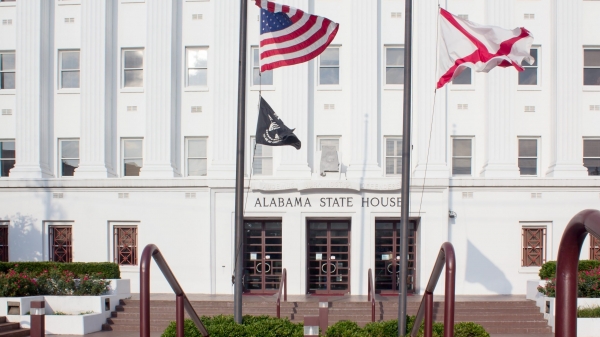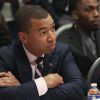By Bill Britt
Alabama Political Reporter
MONTGOMERY—With the 2016 Legislative Session a little more than two months away, the challenges set before our lawmakers are coming into focus.
A few of the items which will top the agenda are: public corruption, Obamacare, taxes, prisons, and public pensions. None of these issues are new, but the problems continue to mount, unabated.
First on the agenda for the House will be the question of leadership. Speaker Mike Hubbard stands charged by the State with 23 felony indictments of public corruption. Hubbard was reelected Speaker almost unanimously in 2014, primarily due to a dazzling PR campaign that painted the State’s Republican Attorney General as engaging in Chicago-style gutter politics (as stated by Congressman Mike Rogers). Hubbard also garnered votes because many legislators lack the courage to stand-up to the “fearsome punisher.”
Emails requested by the defense have revealed a very unflattering picture of Mike Hubbard. Over the last year, once ardent supporters have broken with the criminally charged Speaker, and are determined to see a change in leadership.
Hubbard still has allies in both the Republican and Democratic caucuses, so challenging his authority may prove difficult. However, momentum is growing after Hubbard dared to pass laws designed to help his defense. Rep. Phil Williams has publicly announced he is running for Speaker, others are quietly building support for their candidacy. Most now believe the 2016 Session cannot be successful with Hubbard at the helm.
Recent statements by Gov. Robert Bentley have made it clear that he wants to expand Medicaid under the Affordable Care Act. His health study group has made recommendations in favor of expansion, and Bentley has signaled he would like to see a Constitutional Amendment passed that would allow for a statewide lottery to pay for the expansion. Polling numbers show that a majority of voters would approve a lottery if given an opportunity. Bentley’s idea of using a lottery will face opposition, not only from anti-gambling Republicans, but also from Democrats who want lottery funds to enhance education funding.
An omnibus gaming bill presented at the last session by Senate President Pro Tem Del Marsh (R-Anniston), is taking a backseat to his political ambitions. Those close to Marsh are warning him off any gaming legislation so as not to offend the 30 percent of Republican primary voters who are anti-gambling.
Marsh’s political calculations seem counterintuitive to the prevailing political winds in favor of the omnibus gaming bill. Politicos and several power business executives have privately expressed concern, and in some cases resentment, to what they see as Marsh betrayal. Marsh had promised to vigorously promote the bill in the 2016 session, but has done a 180, which had one former supporter exclaim, “If he double-crosses us on this he won’t be elected dog catcher in Calhoun County.”
Gov. Bentley has also signaled he is coming back for more tax revenue from the Republican lawmakers.
After two Special Sessions Bentley was able to convince “No new tax” Republicans to impose a host of new taxes on the people of the State. Privately, lawmakers are sick of the Republican Governor driving them to raise taxes while other conservative legislators around the nation are lowering them. Bentley seems poised to spend more political capital to in the 2016 session to raise revenue. The question will be are lawmakers willing to risk their own careers to compromise with a lame duck governor?
As always, our State prisons are overcrowded and underfunded. While some progress was made during the 2015 Session, it was more cosmetic than substantive. Most feel the legislature will continue to tinker around the edges in hopes of a miracle. Miracles in the Justice System have generally been outlawed by lawmakers afraid of being seen as taking money for school children to feed and house prisoners. In the case of prisons, political optics trump good policy.
Retirement System Chief, Dr. David Bronner, was given a few years of relief after he agreed to accept Leura Canary as legal council for the pension system. Lately, however, Sen. Arthur Orr and others have refocused on the pension “behemoth” with an eye toward reform. This push is coming primarily from those who would like to see State pensions privatized to the benefit of large providers, such as Pew’s Public Sector Retirement Systems Project. Pew recently gave a report to Orr’s group that will offer reform plans.
A study by the Institute for America’s Future states, “Conservative activists are manufacturing the perception of a public pension crisis in order to both slash modest retiree benefits and preserve expensive corporate subsidies and tax breaks.”
The report concludes that Pew’s Public Sector Retirement Systems Project, and the Laura and John Arnold Foundation are among those working to “manufacture the perception of crisis and press for cuts to guaranteed retirement income.”
The reform agenda is also getting support from Troy’s Johnson Center, and the Alabama Policy Institute (API). The Johnson Center’s Associate Professor of Economics, Daniel J. Smith, is often an editorial critic of RSA.
Alabama faces myriad problems, but corruption, healthcare, taxation, prison and the State pension funding will certainly be in the forefront of any serious discussions in February.





















































